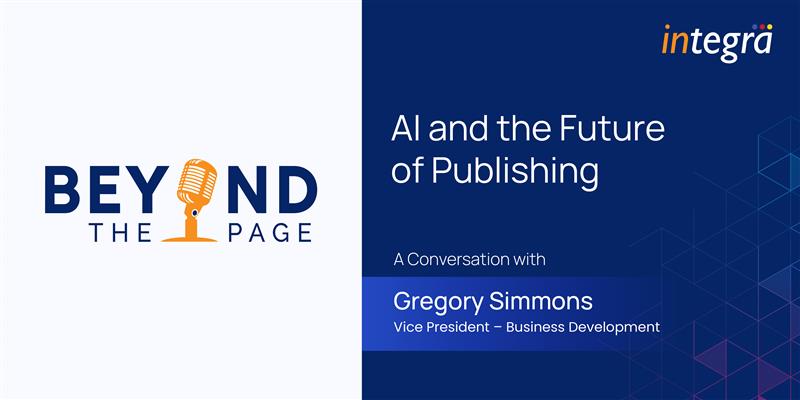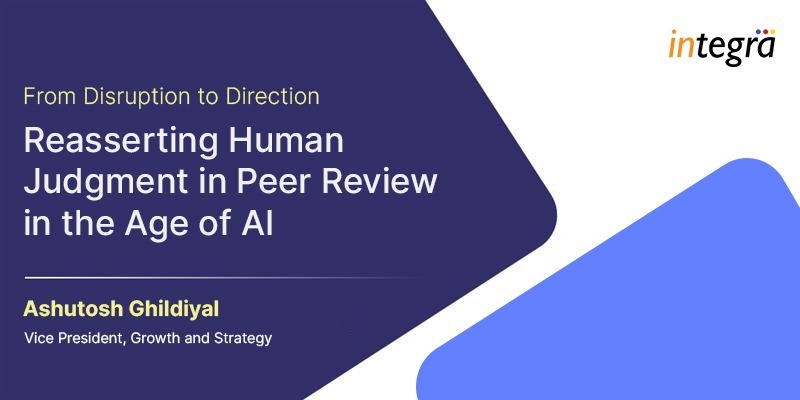
The publishing industry has experienced a dramatic transformation over the past two decades, from the onset of digital technologies to today’s AI-driven automation. As these emerging technologies reshape workflows, publishers must continuously evolve to remain competitive and deliver value to authors, researchers, and readers.
In this interview, we explore the transformative role of AI in publishing and discuss the essential strategies publishers need to adopt in this dynamic landscape. We are delighted to speak with Gregory Simmons, Vice President of Business Development at Integra, whose extensive industry experience provides him with a unique perspective on both the digital transformation era and the ongoing AI revolution. Greg shares his expert insights into the challenges and opportunities ahead, as well as the critical role of relationship-building in the future of publishing.
Getting to Know Greg
Introduction & Background
Greg, welcome to Beyond the Page. Can you share a bit about your professional journey and what led you to join Integra?
Greg: Thank you, happy to be here. My career has always straddled the intersection of education, technology, and publishing. I’ve worked with a range of organizations, from large academic publishers to ed-tech startups, helping them navigate digital transformation and rethink their engagement strategies. What drew me to Integra was their sharp focus on innovation and their deep-rooted commitment to quality and partnership. It felt like a natural fit, especially as we enter a new era driven by AI and automation.
Industry Evolution
Over your more than two decades in education and publishing, what major changes have you observed?
Greg: One of the biggest shifts has been the move from print to digital, and now from digital to data and AI. Initially, the focus was on accessibility and scale. Today, it’s about intelligence: how can we make workflows smarter, decisions faster, and outcomes better for every stakeholder in the publishing chain? We’ve also seen a shift in the power dynamic, authors, reviewers, and institutions now have a stronger voice, and publishers must engage them more meaningfully.
Stakeholder Dynamics
How have stakeholder needs and expectations evolved over time?
Greg: Today’s stakeholders expect transparency, speed, and tailored experiences. Authors want faster peer review and clearer guidance. Institutions seek measurable impact. Publishers are looking for efficiency without compromising on quality. We’re in a world where responsiveness and adaptability matter as much as reputation.
Role and Priorities
As Vice President of Business Development, what are your primary objectives?
Greg: My main priorities are expanding Integra’s presence among global publishers, identifying growth partnerships, and aligning our offerings with the emerging needs of the market. I’m also deeply focused on solution design, ensuring we don’t just pitch services, but co-create value with clients that aligns with their strategic and financial goals.
Strategic Influence
How do you see your role shaping Integra’s strategic direction?
Greg: At Integra, business development isn’t about sales alone, it’s about strategic foresight. By staying close to our clients and the industry pulse, my role is to guide our innovation priorities, surface new service opportunities, and help align our investments with where the market is headed, especially in upstream publishing services and AI-based solutions.
AI and Digital Transformation in Publishing
AI’s Impact Today
How do you see AI reshaping the industry in the current landscape?
Greg: AI is already transforming peer review, content curation, and editorial workflows. It’s making it possible to scale quality checks, flag potential ethical issues earlier, and reduce reviewer burden. It’s not replacing human judgment, but it’s becoming an indispensable tool for editorial intelligence and operational efficiency.
Effective AI Adoption
What are some effective strategies for integrating AI into publishing workflows?
Greg: Start small, with clear goals. Focus on high-volume, repetitive tasks like compliance checks, metadata tagging, and similarity detection. Publishers should pilot with a few journals or departments, track ROI, and scale responsibly. And always ensure that AI tools are interpretable, editors need to understand and trust the output.
Balancing Efficiency and Quality
How can publishers strike a balance between automation and maintaining high standards?
Greg: The key is to pair automation with human oversight. Think of AI as a first-pass filter, flagging issues, streamlining inputs, while editorial teams focus on judgment calls. Also, make quality a design principle when choosing tools: if it doesn’t enhance editorial integrity, it’s the wrong solution.
Overcoming Adoption Gaps
Where are publishers falling short, and what can they do better?
Greg: There’s often a lack of clear ownership. Is AI a tech initiative, an editorial one, or part of production? Also, many organizations underestimate the change management effort. Training, process redesign, and stakeholder buy-in are as critical as the tool itself. Publishers need a cross-functional AI strategy, not just a vendor contract.
Common Misconceptions
What are some prevalent misconceptions about AI in publishing?
Greg: One major myth is that AI is “plug-and-play” or that it will eliminate jobs. In reality, AI requires customization, oversight, and a cultural shift. And rather than replace editors, it elevates their role, freeing them from mundane tasks so they can focus on what matters: content quality and author support.
Enhancing Key Processes
How do you see AI enhancing peer review and research integrity?
Greg: AI can screen submissions for structural and ethical issues before peer review even begins, saving time and avoiding reviewer fatigue. It can also help detect duplicate publications, manipulated images, or undisclosed conflicts. And with large-language models, we can even support editors in drafting decisions or summarizing reviewer feedback.
Relationship-Building in the Publishing Industry
Evolution of Relationships
How do you envision publisher relationships evolving in a more digital, AI-focused era?
Greg: Relationships are becoming more consultative. Clients aren’t just buying services, they want insights, strategic alignment, and thought partnership. Even as automation increases, relationship value is shifting from transactional to transformative.
Maintaining a Personal Touch
What approaches can publishers use to stay connected with stakeholders?
Greg: Be proactive. Share insights, not just updates. Use data to personalize interactions. And most importantly, keep listening. In a world of dashboards and bots, empathy and attentiveness are competitive advantages.
Business Development Strategies
What strategies have you found most effective in cultivating long-term relationships?
Greg: Clarity, consistency, and curiosity. Be clear about value, consistent in delivery, and curious about the client’s evolving world. The best relationships grow not just from solving problems but from spotting opportunities together.
Customer Acquisition
How do you approach customer acquisition in this trust-centric industry?
Greg: Through thought leadership, proof of execution, and building credibility before the pitch. Case studies, references, and showing genuine understanding of a client’s unique challenges go a long way.
Managing Relationship Challenges:
What are some key challenges and how can companies overcome them?
Greg: Misaligned expectations and communication gaps are common. These can be mitigated through upfront alignment sessions, transparent roadmaps, and having joint success metrics. A shared language of outcomes helps a lot.
The Future of Publishing and AI
Emerging Trends
What trends will shape publishing in the next five to ten years?
Greg: Automation will be ubiquitous. Research integrity will become a competitive differentiator. We’ll see deeper integration between preprint, peer review, and publication stages. And author services, especially for global researchers, will become more targeted, multilingual, and AI-augmented.
AI’s Ongoing Evolution
How do you foresee AI continuing to evolve?
Greg: AI will become more explainable, more domain-specific, and more integrated across systems. I see tools evolving from being reactive to being anticipatory, helping editors spot trends, prevent bottlenecks, and make more informed decisions.
Ethical Considerations
What ethical concerns should publishers keep in mind?
Greg: Bias, transparency, and accountability. Publishers need to ensure their AI tools don’t reinforce biases, that decisions can be explained, and that humans remain in the loop, especially when it comes to editorial decisions.
Integra’s Strategy
What is Integra doing to stay ahead in this AI-driven landscape?
Greg: We’re investing in both our AI product suite and our people. We’ve launched tools for manuscript screening, peer review support, and research integrity. We’re also deepening our consultative offerings, helping publishers design custom workflows and adopt AI responsibly.
Balancing Investment and Quality
How can publishers ensure they don’t compromise quality when investing in AI?
Greg: By defining what “quality” means for their context, speed, accuracy, fairness, author satisfaction, and tracking it continuously. Investments should always be paired with feedback loops, human checks, and an editorial conscience.
Final Thoughts
Key Takeaway
What’s one piece of advice for publishers navigating this changing landscape?
Greg:
Stay adaptive, but don’t chase every trend. Focus on creating resilient workflows, building partnerships, and solving real pain points. Technology should serve strategy, not the other way around.
Looking Forward
What excites you most about the future of publishing and your role at Integra?
Greg: The opportunity to redefine value. To build partnerships that are not just about output but about outcomes. And to help shape a future where technology, ethics, and empathy coexist.
Advice for New Professionals
What advice would you give to someone starting out?
Greg: Be curious. Build cross-functional knowledge. Understand both the human and technical sides of publishing. And never underestimate the power of relationships, they’re the true currency of this industry.
Conclusion
Thank you, Greg, for sharing your valuable insights on the interplay between AI, publishing, and the enduring importance of relationship-building. Your perspective reinforces that while technology continues to revolutionize the industry, the future will still be shaped by human insight, strategic adaptability, and meaningful connection.
We look forward to Integra’s continued leadership in shaping the future of scholarly publishing.
Recent Blogs

Why LaTeX Still Matters in Scholarly Publishing—and How the Right Partner Makes All the Difference

Print, Pedagogy, and AI: The New Architecture of Educational Publishing


